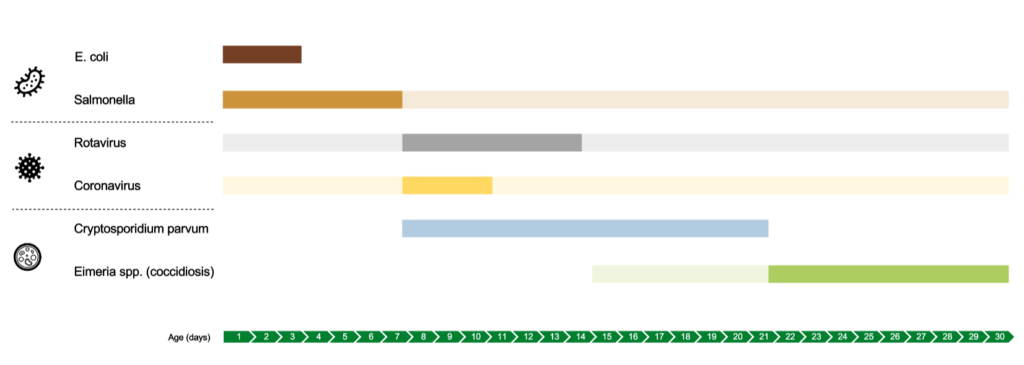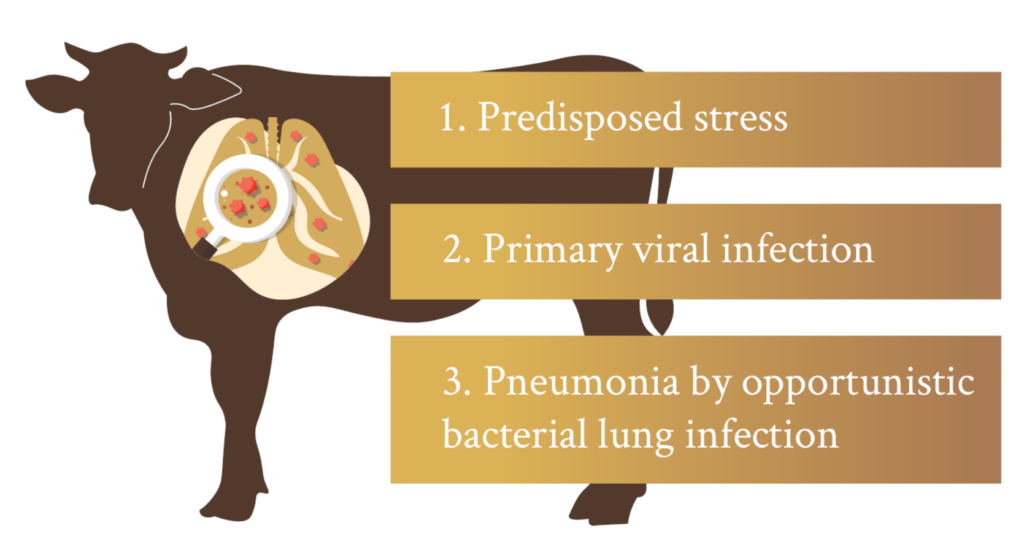Sustainably supporting calf health, right from the start
Written by Frederik Gadeyne, Researcher ruminants at Agrifirm
Calf health problems are still a major issue in the ruminant business worldwide. Diarrhea and respiratory issues are the main diseases occurring early in life. Limiting young animal health issues is a prerequisite to improving overall animal health, which will lead to lower pre-weaning mortality and faster calf growth. In turn, this will enable farmers to improve efficiency by accelerating calf rearing schedules. It is also well known that sick calves generally perform less well as adults. Unfortunately, newborn calves too often suffer from diarrhea or respiratory diseases, which regularly necessitate antibiotics. Reducing the need for antimicrobial treatments will help farmers reduce feeding and veterinary costs, thus generating a more sustainable income. Equally important, this will also reduce the build-up of antimicrobial resistance in the animal sector.
Calf gut health under attack
Calf diarrhea – commonly called ‘scours’ – is still the number one problem in the calf rearing business, especially in dairy calves. Multiple pathogens can be responsible for this. The most common ones are: bacteria such as E. coli or Salmonella; viruses such as bovine rota- or corona virus; or parasites, including Cryptosporidium parvum and Eimeria species, which causes coccidiosis. The prevalence of these diseases can differ, but most of them are common causes of diarrhea in the first weeks of life (Figure 1). The development of scours often leads to severe dehydration of the calves, which causes death if the farmer is unable to rehydrate quickly and effectively enough. Mild diarrhea, in particular, is very prevalent and difficult to cure. Although most animals fully recover from scours, the disease still causes reduced appetite and hence reduced feed intake and growth, leading to inefficient calf rearing. Indeed, the development of rumen and intestinal tissues is hampered during this diarrheic period, which allows other opportunistic pathogens to invade. On top of this, impaired gut health demands a lot of energy and protein to mount an effective immune response against the infection, which otherwise could be invested in the animal’s growth.

Calf lung health under attack
In addition to scours, respiratory problems are of equal importance in the calf business, and most importantly in the veal sector. Again, multiple pathogens can be responsible for this, but most often these problems start with compromised respiratory defense mechanisms due to various predisposed stress situations, followed by a primary infection from respiratory viruses (Figure 2). Typical examples of stressors are: fluctuations in environmental temperature, housing conditions that are too humid, transport at a very young age, and co-mingling with other calves. The most common viruses that cause respiratory problems are bovine respiratory syncytial virus (BRSV), bovine herpesvirus type 1 (BHV1), which causes infectious bovine rhinotracheitis (IBR), or parainfluenza virus type 3 (PI3). Following these viral infections, deeper pulmonary tissues can become colonized and infected by opportunistic bacteria such as Mannheimia haemolytica, Pasteurella multocida and Mycoplasma bovis. These bacterial infections are especially problematic, because they require antibiotic treatments, which promote the build-up of antimicrobial resistance. In intensive calf rearing systems, most prevalent in the veal sector, it is common to apply whole-herd prophylactic antibiotic treatments in order to prevent opportunistic bacteria from destroying entire herds. Therefore, to prevent stressful situations that allow viral and bacterial infections to occur in the first place, it is important to support the calf’s immune system as much as possible during early life.

Supporting calf health in the first phase of life
To give them a head start in life, it is important to provide calves with good quality colostrum. Because of the limited transfer of immunoglobulins (Ig) during gestation, the delivery of the most dominant form IgG through colostrum from the cow to the calf is essential in the first day of life. At Royal Agrifirm Group, we believe that the dry period is extremely important in boosting calf immunity. We recently demonstrated the positive effect on colostrum quality after feeding Aromabiotic Cattle during the dry period (Boosting calf immunity through MCFA in mother’s diet – Agrimprove – Agrimprove).
In addition to colostrum management, vaccinations and good calf rearing management in general are the most common practices to support calf health in the first phase of life. Unfortunately, there is a lack of satisfactory nutritional tools to tackle calf health issues in the first weeks after birth. One way to incorporate effective nutritional support in a calf’s diet is via the calf starter, but solid feed intake levels are very low during the first days and start only after a few weeks of life. Hence, applying a functional feed ingredient via the calf milk replacer (CMR) is the fastest, easiest and most effective way for farmers to support the calf’s health early in life. Agrimprove and Earlyfeed experts at Royal Agrifirm Group are working every day to develop sustainable solutions that can help farmers limit calf health diseases as effectively as possible. Medium-chain fatty acids (MCFA) are one nutritional option, but they are often not sustainably sourced but instead derived from palm kernel or coconut. That’s why we are currently developing START+ Calves, a health-supporting CMR supplement, based on sustainable MCFA, which originate in waste streams. These kinds of products will help build the resilience of young calves and reduce antimicrobial resistance.
This contact was suggested based on the location you are browsing from. You can of course also consult our other contacts and locations here.

